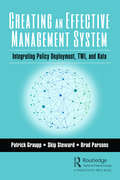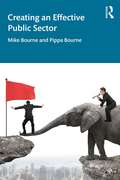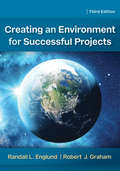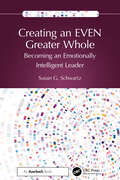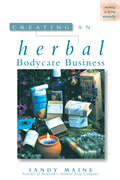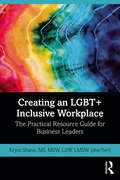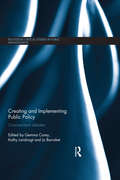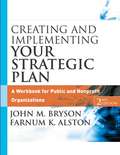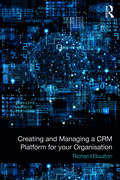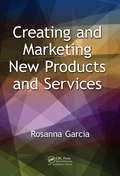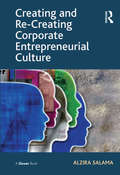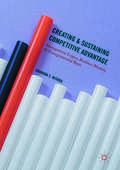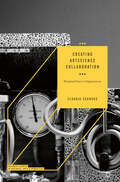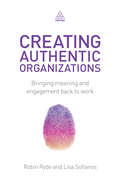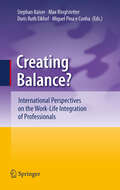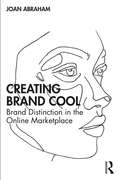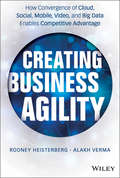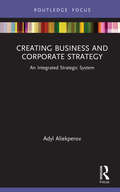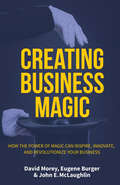- Table View
- List View
Creating Actionable Insights Using Tableau CRM: Learn how to build insightful and actionable data analytics dashboards
by Mark TossellLeverage Tableau CRM to generate valuable business insights and solve business problems efficientlyKey FeaturesExtract, combine, transform, and visualize your data to derive business insights using Tableau CRMGain hands-on experience as you walk through practical dashboard use cases in Tableau CRMLearn how to build best-in-class dashboards from a Tableau CRM thought leaderBook DescriptionTableau CRM, formerly Einstein Analytics, is a powerful and versatile data analytics platform that enables organizations to extract, combine, transform, and visualize their data to create valuable business insights. Despite being a highly capable tool and in high demand in the industry, proficiency in Tableau CRM skills is hard to find.Creating Actionable Insights Using Tableau CRM provides a hands-on approach to Tableau CRM implementation and associated methodologies that will have you up and running and productive in no time. The book provides you with detailed explanations of essential concepts to help you to gain confidence and become competent in using the Tableau CRM platform for data extraction, combination, transformation, visualization, and action. As you make progress, you'll understand what Tableau CRM is and where it provides business value. You'll also learn how to bring your data together in Tableau CRM, build datasets and lenses for data analysis, create effective analytics dashboards for visualization and consumption by end users, and build dashboard actions that take the user from data to insight to action with ease.By the end of this Tableau book, you'll be able to solve business problems using Tableau CRM and design, build, test, and deploy Tableau CRM analytics dashboards efficiently.What you will learnImplement and configure Tableau CRM from scratchBuild your first Tableau CRM analytics app and embed your Tableau CRM dashboards in Salesforce to enhance user adoptionConnect Salesforce and external data with Tableau CRM and create datasetsCreate a data recipe and get familiar with the recipe UIBuild a custom dashboard in Tableau CRM using the dashboard editorUse lenses to create a Tableau CRM analytics dashboardConfigure and implement data security and governanceBuild configured record actions to automate data directly in SalesforceWho this book is forThis book is for data analysts, business analysts, BI professionals, and Salesforce users who want to explore Tableau CRM's capabilities and features. Basic knowledge of Salesforce and data analytics is assumed to get the most out of this book.
Creating an Effective Management System: Integrating Policy Deployment, TWI, and Kata
by Patrick Graupp Skip Steward Brad Parsons"The decades of experience-based wisdom that Graupp, Steward and Parsons share will set you on a new path to a more joyful organization and the tangible results it will produce." Rich Sheridan, CEO, Menlo Innovations; author of Joy, Inc. and Chief Joy Officer "A fine book by skilled practitioners that integrates Kata and TWI, with Strategy Deployment in pursuit of an integrated management system. Well done, Skip, Brad and Patrick." Pascal Dennis, president, Lean Pathways Inc.; author of Lean Production Simplified, Andy & Me, Andy & Me and the Hospital, Getting the Right Things Done, and The Remedy "In this practical and engaging book, Patrick Graupp, Skip Steward, and Brad Parsons give a concise and extremely clear explanation of what systems thinking looks like in a healthcare setting. And they do so in a way that translates easily to any type of organization. Highly recommended!" Alan Robinson, co-author of Ideas Are Free and The Idea-Driven Organization Despite the vast library of knowledge on Lean tools and models, the majority of Lean implementations fail to sustain themselves over time for lack of a functioning management system. In turn, when organizations try to apply a prescribed, one-size-fits-all, management system they inevitably find that what works for others may not work quite as well in their unique situation. Putting the right pieces in the right places is the prime challenge for every organization and no two successful management systems will, or should, be the same. This book provides and examines core principles that must be in place for an organization to find what an effective management system should constitute for them. It outlines key elements and how they work together as a necessary system to achieve overall success. Based on their extensive experience with organizational development and hands-on leadership in policy deployment, TWI and Kata, the authors describe their own journey in helping organizations discover and develop systems that function like well-designed and smooth-running machines while capturing the humanistic aspects of the foundational skills that emphasize the inherent synergy of the system. Readers will learn to help their own organizations "connect the dots" between the various pieces of Lean methodology and effectively create their own management systems that ultimately fulfil customers’ needs and expectations.
Creating an Effective Public Sector
by Mike Bourne Pippa BourneThis book offers an in-depth look at developing effectiveness in the public sector and how to achieve the best possible outcomes for people rather than just good or efficient outputs. In 15 comprehensive chapters, the authors present structured ideas and practical approaches for achieving a more effective public sector. The book sets out a framework for visualising success in complex situations with multiple stakeholders. Topics include how you stimulate change and influence people to adopt changes, how you manage politics, set targets and standards, and measure them, and how you create a culture of high performance with a focus on getting the right things done. Effectiveness does not arise from excellence in one area alone and the book weaves together ideas on leadership, managing expectations, and keeping focus on the longer term. Creating an Effective Public Sector will be of interest to decision makers in the public sector, project managers working on central and local government projects, and senior civil servants. It will also be invaluable for advanced undergraduate and post-graduate students studying in the fields of government, project management, and public-sector management.
Creating an Environment for Successful Projects, 3rd Edition: The Quest To Manage Project Management (Business And Management Ser.)
by Randall Englund Robert J. GrahamNow in its third edition, this project management classic has been updated with an array of field-tested tools to help upper management ensure the success of projects within organizations. For over twenty years, Creating an Environment for Successful Projects has been a staple for upper managers who want to help projects succeed. This new edition includes case studies from companies that have successfully applied the approach, along with practical tools such as templates, surveys, and benchmark reports for savvy leaders who want to ensure project success throughout their organizations. The insights in this book will help management speed projects along instead of getting in their way. All too often, well-intentioned managers put roadblocks in the team's way instead of empowering them with the tools they need to succeed. This approach to project environments, grounded in decades of research and practice, will help you make your organization the most project-friendly it's ever been. Organizational changes rarely work unless upper management is heavily involved. Although project managers are most closely responsible for the success of projects, upper managers are the ones who ultimately create an environment that supports those projects. The way upper managers define, structure, and act toward projects has an important effect on the success or failure of those projects and, consequently, the success or failure of the organization. This book helps all managers understand the need for project management changes and shows how to develop project management as an organizational practice.
Creating an EVEN Greater Whole: Becoming an Emotionally Intelligent Leader
by Susan G. SchwartzLeadership is not a solo sport; it’s about people and how they engage with one another. True leadership isn’t driven by an individual’s ego, but by the ability to connect, understand, and inspire others. Emotional Intelligence (EQ) enables leaders to shift their mindset, empowering their teams to reach their highest potential. Creating an Even Greater Whole: Becoming an Emotionally Intelligent Leader offers managers a fresh perspective and practical tools to navigate their leadership journey.
Creating an Herbal Bodycare Business (Making A Living Naturally Ser.)
by Sandy MaineStart a profitable company making the natural products you love. Professional soapmaker Sandy Maine shares her business-building methods and inspiring philosophy to help you turn your passion into a vocation. Taking the mystery out of entrepreneurship, Maine provides clear advice on how to develop a sound business plan, identify your client base, create attractive packaging, set prices, manage an accounting system, employ staff, and much more. Get ready to take your herbal product to the marketplace.
Creating an HR Scorecard
by Mark A. Huselid Brian E. Becker Dave UlrichA comprehensive HR Scorecard, though unique to each company, should cover four major themes: key human resource deliverables that will highlight HR's role in your firm's overall strategy, a High-Performance Work System, the alignment of that system with firm strategy, and the efficiency with which deliverables are generated. Guiding HR professionals through these steps, this chapter covers the essentials for constructing an HR Scorecard that will establish a balance between cost control and value creation.
Creating an LGBT+ Inclusive Workplace: The Practical Resource Guide for Business Leaders
by Kryss ShaneSetting out best practices and professional guidance for creating LGBT+ inclusive workplaces, this approachable and easy to follow book guides current and future leaders of all industries toward appropriate and proven ways to create safer working environments, update company policies, enhance continuing education and training, and better support LGBT+ people in the workplace. Featuring real-life situations and scenarios, a glossary, and further resources, Creating an LGBT+ Inclusive Workplace enables professionals in all aspects of professional roles to integrate foundational concepts into their everyday interactions with staff at all levels as well as within the community to create an overall workplace culture that nurtures a welcoming, inclusive, and affirming environment for all. This book includes postcards from PostSecret as its foreword and more than a dozen exclusive interviews from the world’s top leaders in a variety of industries with world-renowned reputations. Enabling professionals in a variety of business roles to create an overall workplace culture that nurtures a welcoming, inclusive, and affirming environment for all, this book is an essential resource for independent readers, department teams, and entire corporations.
Creating and Implementing Public Policy: Cross-sectoral debates (Routledge Critical Studies in Public Management)
by Gemma Carey Kathy Landvogt Jo BarraketIn order to address major social policy problems, governments need to break down sectoral barriers and create better working relationships between practitioners, policymakers and researchers. Currently, major blockages exist, and stereotypes abound. Academics are seen as out-of-touch and unresponsive, policymakers are perceived to be justifying policy decisions, and the community sector seeks more funding without demonstrating efficacy. These stereotypes are born out of a lack of understanding of the work and practices that exist across these three sectors. Drawing on ground-breaking research and partnerships, with contributions from senior public servants, this book explores the competing demands of different actors involved in policy change. It challenges current debates, assumptions and reflects a unique diversity of experiences. Combined with differing theoretical perspectives, it provides a uniquely practical insight for those seeking to influence public policy. This innovative text provides essential reading for community sector practitioners, academics and advanced level students in public policy, social policy and public administration, as well as for public service professionals.
Creating and Implementing Your Strategic Plan
by John M. Bryson Farnum K. AlstonCreating and Implementing Your Strategic Plan is the best-selling companion to John Bryson's landmark book, Strategic Planning for Public and Nonprofit Organizations. This new edition of the workbook is completely revised and updated and can be used as a stand-alone resource or as a companion to Strategic Planning for Public and Nonprofit Organizations. A step-by-step guide to putting strategic planning to work in public and nonprofit organizations, this indispensable workbook includes easy-to-understand worksheets and clear instructions for creating a strategic plan tailored to the needs of the individual organization. From setting up the meeting room to establishing a vision of the future, every step of the strategic planning process is covered. The workbook shows how to:Refine your organization's mission and valuesAssess your internal and external environmentIdentify and frame strategic issuesFormulate strategies to help manage the issuesCreate, review, and adopt the strategic planAssess the strategic planning process
Creating and Managing a CRM Platform for your Organisation
by Richard BoultonMore than ever, organisations are facing a data avalanche from various sources, be they in electronic or hard copy format. How an organisation manages this ever-increasingly important resource – data – can benefit or hinder its ability to achieve its objectives. Creating and Managing a CRM Platform for Your Organisation not only covers how the principles of data management, including data quality and data security, can be applied to an organisation’s customer relationship management (CRM) platform, but also highlights how aspects of data management, marketing and technology are needed to operate, develop and manage a CRM platform in order to carry out tasks such as reporting and analysis, developing data plans, undertaking data audits, data migrations and campaign mailings which will result in an organisation using data effectively in order to achieve its goals and objectives. The issues and topics covered apply to all organisations that use a CRM platform and the data it contains as part of their business activities, regardless of the industry sector or size of the organisation. A comprehensive overview of the practices that can be effectively implemented when managing a CRM platform, this book is essential reading for professionals involved in the administration of the CRM platform within their organisation and data management.
Creating and Marketing New Products and Services
by Rosanna GarciaThis textbook teaches the key business and marketing principles needed to successfully design and launch new products and services in an international marketplace. The book emphasizes marketing research techniques that can help firms identify the voice of the customer and incorporate these findings into their new product development process. It addresses the role of social networks in innovation, open innovation strategies, and international co-development efforts of new products and services.
Creating and Re-Creating Corporate Entrepreneurial Culture
by Alzira SalamaEntrepreneurship is often considered only in the context of new venture creation, small business issues, and the profiles and personalities of individual entrepreneurs. The emphasis in Creating and Re-Creating Corporate Entrepreneurial Culture is very much on the 'corporate', it focuses on the creation and maintenance of an entrepreneurial management culture that accelerates growth and enhances effectiveness and competitiveness in large organizations. Alzira Salama explains what constitutes entrepreneurial behaviour, how it is facilitated by organizational culture and why entrepreneurial corporate culture is fundamental to business success. She takes you through ways of identifying prevailing cultures and explains how cultures are reinforced or changed. Drawing on exemplary case studies from around the world, she tells the stories both of successful and unsuccessful interventions made in response to the need to move on from bureaucratic or authoritarian cultures. These include specific instances where the context has been privatization, merger and acquisition, transition in the wider economy, or a combination of any of these circumstances. This enlightening book will help managers and consultants, business educators, higher level students and those on executive programmes to understand the nature of an organization's culture, why it is as it is, whether it needs to change, and how it might be changed. Alzira Salama offers real world examples of how to create or re-create an entrepreneurial culture together with tools that will enable corporations to achieve it.
Creating and Sustaining Competitive Advantage
by Chandra S. MishraThis book develops a unified framework to explain the phenomena of competitive advantage and firm value creation in dynamic environments. Through a new strategic value creation theory, it explores how a firm can measure and sustain its competitive advantage through management incentives, capital market forces, organizational culture and structure, and social complexity. It also considers how management can utilize their resources and capabilities, shadow options, product market forces, customer needs, and organizational learning as a means to differentiate them from the competition. With an innovative approach to theory and research, it will be positioned to inform both scholars and practitioners in management, business strategy, and entrepreneurship on the process of competitive and sustainable value creation.
Creating Arc-of-Career Flexibility: Keeping Talented Women on the Road to Success
by Sylvia Ann HewlettAccording to the author, there are six essential elements that need to gain real traction if a company is to fully realize female talent over the long haul. This chapter addresses one of these essential elements: policies that provide flexibility over the arc of a career and allow women to ramp up after taking time out of the paid workforce.
Creating ArtScience Collaboration: Bringing Value to Organizations (Palgrave Studies in Business, Arts and Humanities)
by Claudia SchnuggHow can artist-scientist collaboration be of value to science and technology organizations? This innovative book is one of the first to address this question and the emerging field of art-science collaboration through an organizational and managerial lens. With extensive experience collaborating with and advising institutions to develop artist in residency programs, the author highlights how art-science collaboration is such a powerful opportunity for forward-thinking consultants, managers and institutions. Using real-life examples alongside cutting edge research, this book presents a number of cases where these interactions have fostered creativity and led to heightened innovation and value for organizations. As well as creating a blueprint for successful partnerships it provides insights into the managerial and practical issues when creating art-science programs. Invaluable to scholars and practitioners interested in the potential of art-science collaboration, the reader will be shown how to take an innovative approach to creativity in their organization or research, and the ways in which art-science collaborations can mutually benefit artists, scientists and companies alike.
Creating Authentic Organizations
by Lisa Sofianos Robin RydeIn the complex and global economy it's more important than ever that we recognize and respond to the need for employees to bring their authentic selves to work. Doing so can mean increased innovation, productivity, more thoughtful risk taking, a sense of responsibility and increased adaptiveness to change.Creating Authentic Organizations works beyond the limited remit of authentic leadership and shows how this concept can and should be applied to your workforce. With simple and powerful models and strategies it will show you how to ensure more authentic dialogue, both between employees to discuss smaller issues and also to ensure open and meaningful discussion around threats and challenges. Bold and cutting edge, it offers a simple framework for a new set of management principles relating to self-management, empowerment and the freedom to operate. By re-framing the role of management, Creating Authentic Organizations will help you implement real meaning at work and improve organizational resilience.
Creating Balance?: International Perspectives on the Work-Life Integration of Professionals
by Max Josef Ringlstetter Stephan Kaiser Miguel Pina e Cunha Doris Ruth EikhofA satisfactory and healthy integration of work with other life domains is one of the key challenges of modern society. Work-life balance and work-life integration have become focal points of today's human resource management practice and theory. Professionals who have been described as "extreme workers" regarding their work hours and engagement are under particular pressure to balance work and "the rest of life". This collection maps the increasingly extensive discussion of work-life issues for professionals and discusses key aspects in depth. What is work-life integration? What are the specific challenges for professionals? How do they manage their blurred work-life boundaries? How can companies intervene? Internationally leading authors discuss antecedents and individual and organizational outcomes of work-life integration, gender-specific perspectives and challenges as well as the use and usefulness of corporate work-life balance initiatives. In five sections distinguished researchers from across the world present experiences and research findings to provide a compendium of academic and applied research on the work-life integration of professionals. Cutting-edge research and novel theoretical perspectives make this collection a source of knowledge and inspiration for academic and business audiences interested in work-life integration issues in general and in the case of professionals in particular.
Creating Brand Cool: Brand Distinction in the Online Marketplace
by Joan AbrahamIn this intriguing blend of branding how-to and business memoir, an industry pioneer presents the thought process and tools to create a successful Ecommerce business by developing a distinct emotional attraction to a brand, beyond individual product offerings. Leveraging her 26 years of experience in online marketing and branding, Joan Abraham reveals the thought process behind successfully addressing today’s marketing challenge: clearly defining the business’s brand essence using its owned social media channels to personalize the full character of the brand. Creating Brand Cool addresses the importance of developing a unique state of being that personally resonates with today’s consumer. Abraham energizes the creative and strategic thinking for attracting and maintaining brand loyalty when the competition is a click away. Appealing to branding and social media marketing professionals, as well as students in these fields, this book is a primer for building an online community and distinguishing a brand from the competition. It is relevant to all types of business, from small businesses to globally recognized brands.
Creating Breakthroughs at 3M
by Mary Sonnack Eric Von Hippel Stefan ThomkeMost senior managers want their product development teams to create breakthroughs--new products that will allow their companies to grow rapidly and maintain high margins. But more often they get incremental improvements to existing products. That's partly because companies must compete in the short term. Searching for breakthroughs is expensive and time consuming; line extensions can help the bottom line immediately. In addition, developers simply don't know how to achieve breakthroughs, and there is usually no system in place to guide them. By the mid-1990s, the lack of such a system was a problem even for an innovative company like 3M. Then a project team in 3M's Medical-Surgical Markets Division became acquainted with a method for developing breakthrough products: the lead user process. The process is based on the fact that many commercially important products are initially thought of and even prototyped by "lead users"--companies, organizations, or individuals that are well ahead of market trends. Their needs are so far beyond those of the average user that lead users create innovations on their own that may later contribute to commercially attractive breakthroughs. The lead user process transforms the job of inventing breakthroughs into a systematic task of identifying lead users and learning from them. The authors explain the process and how the 3M project team successfully navigated through it. In the end, the team proposed three major new product lines and a change in the division's strategy that has led to the development of breakthrough products. And now several more divisions are using the process to break away from incrementalism.
Creating Business Agility
by Alakh Verma Rodney HeisterbergCreating Business Agility: How Convergence of Cloud, Social, Mobile, Video, and Big Data Enables Competitive Advantage provides a game plan for integrating technology to build a smarter, more customer-centric business. Using a series of case studies as examples throughout, the book describes the agility that comes from collaborative commerce, and provides key decision makers the implementation roadmap they need to build a successful business ecosystem. The focus is on Business Agility Readiness in terms of the five major changes affecting the information technology landscape, and how data-driven delivery platforms and decision-making processes are being reinvented using digital relationships with a social business model as the consumer world of technology drives innovation and collaboration.Cloud computing, social media, next-gen mobility, streaming video, and big data with predictive analytics are major forces now for a competitive advantage, and Creating Business Agility provides leaders with a roadmap for readiness. Business leaders tasked with innovation and strategy will find that Creating Business Agility provides important insight from an informed perspective.
Creating Business and Corporate Strategy: An Integrated Strategic System (Routledge Focus on Business and Management)
by Adyl AliekperovBusinesses need strategies that determine the direction of functioning and further development. If a company deals with several multifaceted businesses, each of them subsequently requires their own strategy. The issue of strategy creation and realization is a key factor that must receive the closest possible attention. In order to assure victory and be thoroughly prepared for various directions and situations that may arise, companies create their own unique strategies. This book is primarily aimed at suggesting the necessary repertoire of knowledge and skills for strategy creating with the help of the TASGRAM integrated system – Thinking, Analyzing, Strategy, Goals, Risks, Actions, and Monitoring. The main outcome of TASGRAM is a combined strategic table: business strategy, corporate strategy, goals, risks, actions, and monitoring. Each element in TASGRAM has a concrete goal and it helps users become more focused. Creating Business and Corporate Strategy: An Integrated Strategic System offers a new tool for company strategy creation, showcasing various cases and examples based on theory and practice. Unlike the existing tools, the suggested system of strategy creation is simpler and definite. Its main purpose is to help create and further develop the created strategy, making this book especially valuable to researchers, academics, practitioners, and students in the fields of strategy, leadership, and management.
Creating Business Magic: How the Power of Magic Can Inspire, Innovate, and Revolutionize Your Business
by Eugene Burger David Morey John E. McLaughlinAchieve Exceptional Results and Beat Your Competition"… how the power of magic can ignite your own imagination, power through barriers, and get way ahead of any competition." ?David Copperfield, American magician#1 New Release in Organizational ChangeFirst comes the magic, and then the magic becomes the realityWe are all capable of magic. You may think you know what magic is. Abracadabra, hocus-pocus. Forget about it. Magic is what human beings do. It’s just that some do it a lot better than others.Key business strategy secrets from the world's greatest magicians. This book takes everything that three remarkable authors?a corporate strategist, a former acting CIA director, and a world-renowned magician?have learned about magic and packs it into a unique framework that captures the best of this art form. Then the book relates it directly to key lessons applicable to a wide variety of business enterprises. The authors’ objective is not to create a new generation of magicians, but to adapt nine strategies of the world’s greatest magicians; bolstering innovation, energizing leadership, and sparking business success.Magic and disruptive innovation. Each chapter opens with a scenario depicting a pivotal historic moment in magic (think Harry Houdini, Doug Henning, Penn and Teller, David Copperfield) and uses it as a starting point to explore how the magical technique employed can create a fertile environment for industry, disruptive innovation, and propel a company light years ahead of the competition.Learn how to:Anticipate the next trendsCreate remarkable new productsLaunch marketing and advertising campaigns that will mesmerizeMake dazzling sales presentationsResolve seemingly unsolvable business dilemmasInspire teams with resilient change leadershipIf you have read Creating Magic by Lee Cockerell or Bored and Brilliant by Manoush Zomorodi, you'll want to read Creating Business Magic.

